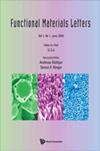Molecular Simulation of (Al-Ga) Surface Garnished with Chromium Metal for Organic Material Detecting: A DFT Study
IF 1.1
4区 材料科学
Q4 MATERIALS SCIENCE, MULTIDISCIPLINARY
引用次数: 0
Abstract
Al–Ga surface doped with chromium (Cr) is theoretically studied using first-principles density functional theory (DFT) at the CAM-B3LYP/EPR-III, LANL2DZ, 6-31+G(d,p) level of theory to explore the chemical adsorption and corrosion inhibition of organic carbenes through coating process. Crystal structure of Cr–(Al–Ga) surface was coated by S–&N–heterocyclic carbenes of benzotriazole (BTA), 2-mercaptobenzothiazole (2MBT), 8-hydroxyquinoline (8HQ) and 3-amino-1,2,4-triazole-5-thiol (ATR). The NMR spectroscopy of the adsorption of BTA, 2MBT, 8HQ, and ATR on the Cr-doped Al–Ga nanoalloy surface represents that this surface can be employed as the magnetic S–&N–heterocyclic carbene sensors. In fact, Cr site in Cr–(Al–Ga) nanoalloy surface has bigger interaction energy amount from Van der Waals’ forces with BTA, 2MBT, 8HQ, and ATR that might cause them large stable towards coating data on the nanosurface. It has been estimated that the criterion for choosing the surface linkage of S and N atoms in BTA, 2MBT, 8HQ, and ATR in adsorption sites can be impacted by the existence of close atoms of aluminum and gallium in the Cr–(Al–Ga) surface. The fluctuation of NQR has estimated the inhibiting role of BTA, 2MBT, 8HQ, and ATR for Cr -doped Al–Ga alloy nanosheet due to S and N atoms in the benzene cycle of heterocyclic carbenes being near the monolayer surface of ternary Cr–(Al–Ga) nanoalloy. Moreover, IR spectroscopy has exhibited that Cr-doped Al–Ga alloy nanosheet with the fluctuation in the frequency of intra-atomic interaction leads us to the most considerable influence in the vicinage elements generated due to inter-atomic interaction. Comparison to [Formula: see text]G[Formula: see text][Formula: see text] amounts versus dipole moment has illustrated a proper accord among measured parameters based on the rightness of the chosen isotherm for the adsorption steps of the formation of BTA @ Cr–(Al–Ga), 2MBT @ Cr–(Al–Ga), 8HQ @ Cr–(Al–Ga), and ATR @ Cr–(Al–Ga) complexes. Thus, the interval between sulfur, nitrogen, and oxygen atoms in BTA, 2MBT, 8HQ, and ATR during interaction with transition metal of Cr in Cr–(Al–Ga) nanoalloy, (N[Formula: see text] Cr, O[Formula: see text] Cr, S[Formula: see text] Cr), has been estimated with relation coefficient of [Formula: see text] = 0.9509. Thus, this paper exhibits the influence of Cr doped on the “Al–Ga” surface for adsorption of S–&N–heterocyclic carbenes of BTA, 2MBT, 8HQ, and ATR by using theoretical methods. Furthermore, the partial electron density or PDOS has estimated a certain charge assembly between Cr–(Al–Ga) and S–&N–heterocycles of BTA, 2MBT, 8HQ, and ATR which can remark that the complex dominant of metallic features and an exact degree of covalent traits can describe the augmenting of the sensitivity of Cr–(Al–Ga) surface as a potent sensor for adsorption of BTA, 2MBT, 8HQ, and ATR heterocycles. This work investigates the characteristics, band structure, and projected density of state (PDOS) of Al–Ga nanoalloy doped with Cr element for increasing the corrosion inhibition of the surface through adsorption of organic molecules of carbenes in the surface coatings process. This paper can be helpful in a range of applications which uses Al–Ga alloy for the study of energy storage and adsorption of air pollution or water contamination. Many different approaches such as surface coatings, alloying, and doping can be adopted to protect the surface.金属铬修饰(Al-Ga)表面用于有机材料检测的分子模拟:DFT研究
采用第一性原理密度泛函理论(DFT)在CAM-B3LYP/EPR-III, LANL2DZ, 6-31+G(d,p)理论水平上对掺杂铬(Cr)的Al-Ga表面进行了理论研究,探讨涂层工艺对有机碳的化学吸附和缓蚀作用。Cr - (Al-Ga)表面的晶体结构由S - n杂环碳包覆,包括苯并三唑(BTA)、2-巯基苯并噻唑(2MBT)、8-羟基喹啉(8HQ)和3-氨基-1,2,4-三唑-5-硫醇(ATR)。BTA、2MBT、8HQ和ATR在cr掺杂Al-Ga纳米合金表面的吸附核磁共振谱表明,该表面可作为磁性S - n杂环碳烯传感器。事实上,Cr - (Al-Ga)纳米合金表面的Cr位点与BTA、2MBT、8HQ和ATR的范德华力相互作用能较大,这可能导致它们对纳米表面的涂层数据具有较大的稳定性。据估计,在Cr - (Al-Ga)表面存在紧密的铝和镓原子,会影响选择吸附位点上BTA、2MBT、8HQ和ATR中S和N原子表面连接的标准。NQR的波动估计了BTA、2MBT、8HQ和ATR对Cr掺杂Al-Ga合金纳米片的抑制作用,这是由于杂环碳的苯环中的S和N原子靠近三元Cr - (Al-Ga)纳米合金的单层表面。红外光谱分析表明,随着原子间相互作用频率的波动,掺杂cr的Al-Ga合金纳米片对原子间相互作用产生的邻近元素的影响最为显著。与[公式:见文]G[公式:见文][公式:见文]量与偶极矩的比较表明,根据所选等温线对BTA @ Cr - (Al-Ga)、2MBT @ Cr - (Al-Ga)、8HQ @ Cr - (Al-Ga)和ATR @ Cr - (Al-Ga)配合物形成的吸附步骤的正确性,所测参数之间存在适当的一致性。由此估算出了Cr - (Al-Ga)纳米合金中BTA、2MBT、8HQ和ATR与过渡金属Cr (N[公式:见文]Cr, O[公式:见文]Cr, S[公式:见文]Cr)相互作用过程中硫、氮、氧原子间的间隔,相关系数为[公式:见文]= 0.9509。因此,本文通过理论方法展示了Cr掺杂在“Al-Ga”表面对BTA、2MBT、8HQ和ATR中S - & n -杂环碳的吸附影响。此外,偏电子密度(PDOS)估计了BTA、2MBT、8HQ和ATR的Cr - (Al-Ga)和S - n -杂环之间存在一定的电荷组装,表明金属特征的复杂优势和共价特征的精确程度可以描述Cr - (Al-Ga)表面作为BTA、2MBT、8HQ和ATR杂环吸附的有效传感器的灵敏度增强。本文研究了掺杂Cr元素的Al-Ga纳米合金的特性、能带结构和投影态密度(PDOS),通过在表面涂层过程中吸附有机分子碳烯来提高表面的缓蚀性。本文的研究对铝镓合金的储能和吸附空气污染或水污染的研究具有广泛的应用价值。可以采用许多不同的方法,如表面涂层、合金化和掺杂来保护表面。
本文章由计算机程序翻译,如有差异,请以英文原文为准。
求助全文
约1分钟内获得全文
求助全文
来源期刊

Functional Materials Letters
工程技术-材料科学:综合
CiteScore
2.40
自引率
7.70%
发文量
57
审稿时长
1.9 months
期刊介绍:
Functional Materials Letters is an international peer-reviewed scientific journal for original contributions to research on the synthesis, behavior and characterization of functional materials. The journal seeks to provide a rapid forum for the communication of novel research of high quality and with an interdisciplinary flavor. The journal is an ideal forum for communication amongst materials scientists and engineers, chemists and chemical engineers, and physicists in the dynamic fields associated with functional materials.
Functional materials are designed to make use of their natural or engineered functionalities to respond to changes in electrical and magnetic fields, physical and chemical environment, etc. These design considerations are fundamentally different to those relevant for structural materials and are the focus of this journal. Functional materials play an increasingly important role in the development of the field of materials science and engineering.
The scope of the journal covers theoretical and experimental studies of functional materials, characterization and new applications-related research on functional materials in macro-, micro- and nano-scale science and engineering. Among the topics covered are ferroelectric, multiferroic, ferromagnetic, magneto-optical, optoelectric, thermoelectric, energy conversion and energy storage, sustainable energy and shape memory materials.
 求助内容:
求助内容: 应助结果提醒方式:
应助结果提醒方式:


